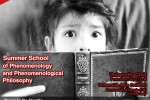Posts Tagged ‘
Husserl ’
Apr 6th, 2013 |
By Marc Applebaum

Who’s Afraid of Forms? is an advanced summer program in phenomenological philosophy to be held July 1-4, 2013 at the University of Calabria. Seminars, delivered in English, will be led by Professors De Warren, Hopkins, Majolino and Palombi, and will address topics in the philosophy of science, ontology, ethics and politics. For details consult the program. To participate, please
[continue reading…]
Posted in Uncategorized |
Comments Off on Who’s Afraid of Forms? Phenomenological Philosophy Summer Program: July 1-4 University of Calabria, Italy
Tags: conference, Ferrarello, Husserl
Mar 27th, 2013 |
By Marc Applebaum

I love Teo and Febbraro’s (2002) observation that “Psychology’s history can be studied as a history of fads” (p. 458). Teo (1996) has written that psychologists “have tended to value meta-theoretical constructions from outside their discipline more than those from inside their disciplines,” with the popularity of these constructions shifting as one or another current
[continue reading…]
Posted in Praxis |
2 comments
Tags: Applebaum, cultural psychology, Husserl, Mohanty
Feb 6th, 2013 |
By Marc Applebaum

Students new to phenomenological psychology often ask me what’s the difference between Clark Moustakas’ and Amedeo Giorgi’s research methods, since both approaches are called “phenomenological.” In fact there are major differences: in this post I’ll examine Moustakas’ Phenomenological Research Methods (1994) from the perspective of Husserl and Merleau-Ponty’s phenomenological philosophy. Naturally I’ll also be speaking as
[continue reading…]
Posted in Research |
2 comments
Tags: Applebaum, epoche, Giorgi, human science, Husserl, research
Feb 2nd, 2013 |
By Marc Applebaum

Reading J. N. Mohanty’s essay “Husserl’s Concept of Intentionality” in Analecta Husserliana I (1971), the following passage, discussing the Logische Untersuchungen, stood out to me: “The static analysis lays bare the structure of what is called an intentional act whereby the word ‘act’ has to be taken not in its ordinary usage as meaning an activity or a process, but
[continue reading…]
Posted in Praxis |
4 comments
Tags: Applebaum, Husserl, intentionality, Mohanty
Jan 27th, 2013 |
By Marc Applebaum

Dr. Susi Ferrarello opened our January 2013 graduate seminar on Descriptive Phenomenological Psychology with this introductory lecture–her aim was to acquaint Saybrook’s doctoral psychology students with the tradition of philosophical inquiry in which Husserl’s phenomenology is situated. You’ll see her presentation was a wide-ranging invitation to participate in the questioning that is the philosophical tradition–
[continue reading…]
Posted in Research |
Comments Off on Ferrarello: Introducing Phenomenological Philosophy to Psychologists
Tags: Ferrarello, human science, Husserl
Dec 23rd, 2012 |
By Marc Applebaum

Introduction The descriptive phenomenological method of psychological research is rooted in the intentional property of consciousness. Husserl (1983) modified Brentano’s concept of intentionality, expressing it as consciousness acting upon an object or state-of-affairs that is not itself. In other words, embodied human subjectivity relates actively and passively to things that are immanent and external to it
[continue reading…]
Posted in Praxis |
4 comments
Tags: Broomé, Giorgi, Husserl, research
Oct 13th, 2012 |
By Marc Applebaum

Philosopher Ludwig Landgrebe (1902-1991) was one of Husserl’s closest assistants. Landgrebe’s description of Husserl below was translated by Algis Mickunas, Professor Emeritus, Ohio University, and included by Lester Embree in his Representation of Edmund Husserl: “Almost everyone who first encountered Husserl experienced something of a disappointment at not immediately seeing any external signs of how
[continue reading…]
Posted in Merleau-Ponty |
Comments Off on What was it like to study with Husserl?
Tags: Husserl
Oct 12th, 2012 |
By Marc Applebaum

This conversation between philosopher Susi Ferrarello and me began, as is often the case in phenomenology, with an everyday experience: dreaming. My description of a dream led us to reflect on Merleau-Ponty’s discussions of dreaming and waking perception, and Husserl’s active and passive intentionality. The exchange continued over several weeks, and we’ve summarized it here–
[continue reading…]
Posted in Merleau-Ponty |
Comments Off on The Phenomenology of Dreaming: A Dialogue
Tags: Applebaum, embodiment, Ferrarello, Husserl, Merleau-Ponty
Sep 19th, 2012 |
By Marc Applebaum

Introduction Intersubjectivity can be described as a relationship between me and an other. The peculiarity of this relationship lies in the fact that the other is not alien to me, but is “within me” in a way that his or her “otherness” can be investigated beginning with the way in which that “otherness” is imminent
[continue reading…]
Posted in Merleau-Ponty |
Comments Off on Ferrarello: Husserl, Intersubjectivity, and Lifeworld
Tags: Ferrarello, Husserl, intersubjectivity, reduction
Sep 3rd, 2012 |
By Marc Applebaum

I recently posted a short discussion of what “the natural attitude” means in Husserl’s phenomenology. As I mentioned, the natural attitude is the perspective of everyday life. For Husserl the process he calls the phenomenological reduction is the means by which the phenomenologist frees himself from the reifications of the natural attitude, gaining a standpoint
[continue reading…]
Posted in Merleau-Ponty |
1 Comment »
Tags: Applebaum, epoche, Gurwitsch, Husserl, reduction









